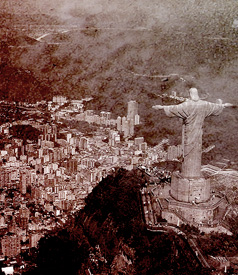
Rio de Janeiro
Not long ago a deadly clash between two drug-trafficking gangs caused an escalation of violence in the Morro dos Macacos favela,north of Rio de Janeiro. The fighting lasted several hours and caused 17 death,including two police officers. In light of the seriousness of the situation, this past Sunday, local authorities ordered the deployment of 4,500 additional officers to provide surveillance support in the area.
In Rio's favelas, conflicts of this nature are nothing new, but now that the city is set to host the 2016 Olympic Games, the situation has become newsworthy. Expressions of urban violence - between gangs and police officers or among the gangs themselves - form part of the daily routine in the 900 favelas that sit in the mountains surrounding Rio de Janeiro. This past year alone, in incidents denounced by humanitarian organizations as "police brutality," some 1,100 people were killed on the streets under the charge of "resisting arrest."
These alarming numbers stem from a shattered social fabric in which large swaths of the Brazilian population are mired in poverty, marginalized and denied basic human rights. Despite the significant and sustained economic growth that Brazil has registered in recent years - a development made possible by its vast oil reserves - Brazil continues to rank, according to the latest United Nations Human Development Report, as the country with the greatest measures of inequality in all of Latin America.
In addition to these social factors, rampant and deeply entrenched corruption in Brazil's public institutions is also enabling the violence, particularly with regards to the country's inability to contain the flow of illegal firearms. According to findings by the nongovernmental organization Viva Rio, organized gangs in Brazil are currently in possession of approximately four million illegal weapons.
The above evidence leads to one inescapable conclusion: The solution to the problems of violence and instability that confront Rio de Janeiro - and Brazil in general - cannot be solved with methods that do not address the root causes: poverty, marginalization, inequality and corruption.
Such a task, however, may seem like a tall order for a country in which the conservative elites continue to criminalize, isolate and even wipe out the poor. This line of thinking, which was taken to the extreme with the notorious death squads that murdered poor people and children on the street, seems to have been adopted by the local government of Rio de Janeiro, which, several months ago, set out to build a wall around the favelas, a proposal that has been met with much resistance and charges of discrimination.
In sum, nothing guarantees that the Brazilian authorities can eradicate Rio de Janeiro's problem simply through the construction of walls and the application of police force. These methods can be successful in the short term, and even ensure the realization of a smooth Olympics, but violence will inevitably rear its head again and again if its root causes are not attended to appropriately and completely.
With 2016 Olympics Games hosted in Rio de Janeiro,people are more and more worrying about its safety problems now. You'd better take safety issues into consideration before you go to Brazil in 2014!But I think the country will take more actions because people all over the world are now watching its moves!



